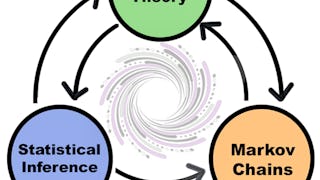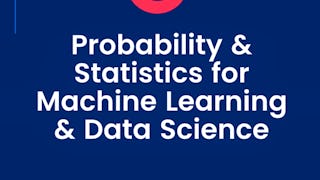- Browse
- Probability Theory
Results for "probability theory"
 Status: Free TrialFree TrialU
Status: Free TrialFree TrialUUniversity of Pittsburgh
Skills you'll gain: Probability Distribution, Data Science, Probability & Statistics, Predictive Analytics, Probability, Statistical Modeling, Data Analysis, Regression Analysis, Logistic Regression, Statistical Analysis, Statistical Methods, Statistical Machine Learning, Bayesian Statistics, Statistical Inference, Feature Engineering, Applied Mathematics, Python Programming, Machine Learning, Algorithms
Build toward a degree
Beginner · Course · 1 - 4 Weeks
 Status: Free TrialFree TrialU
Status: Free TrialFree TrialUUniversity of Colorado Boulder
Skills you'll gain: Probability, Statistical Inference, Estimation, Statistical Methods, Probability & Statistics, Statistics, Probability Distribution, Markov Model, Data Literacy, Statistical Analysis, Sampling (Statistics), Bayesian Statistics, Applied Mathematics, Artificial Intelligence, Generative AI, Data Science, Theoretical Computer Science, Data Analysis, Machine Learning Algorithms, Mathematical Theory & Analysis
Build toward a degree
4.4·Rating, 4.4 out of 5 stars340 reviewsIntermediate · Specialization · 3 - 6 Months
 Status: NewNew
Status: NewNewIntermediate · Specialization · 3 - 6 Months
 Status: PreviewPreviewU
Status: PreviewPreviewUUniversity of Zurich
Skills you'll gain: Probability, Probability Distribution, Probability & Statistics, Statistics, Descriptive Statistics, Applied Mathematics, Risk Analysis, Finance
4.8·Rating, 4.8 out of 5 stars1.9K reviewsBeginner · Course · 1 - 3 Months
 Status: Free TrialFree TrialJ
Status: Free TrialFree TrialJJohns Hopkins University
Skills you'll gain: R Programming, Statistical Analysis, Statistical Programming, Data Analysis, Probability, Probability Distribution, Applied Machine Learning, Probability & Statistics, Applied Mathematics, Data Science, Computational Thinking, Simulations
Intermediate · Course · 1 - 3 Months
 Status: Free TrialFree TrialD
Status: Free TrialFree TrialDDeepLearning.AI
Skills you'll gain: Descriptive Statistics, Bayesian Statistics, Statistical Hypothesis Testing, Probability & Statistics, Sampling (Statistics), Probability Distribution, Probability, Statistical Inference, A/B Testing, Statistical Analysis, Statistical Machine Learning, Data Science, Statistical Modeling, Exploratory Data Analysis, Statistical Visualization
4.6·Rating, 4.6 out of 5 stars678 reviewsIntermediate · Course · 1 - 4 Weeks
What brings you to Coursera today?
 Status: Free TrialFree TrialU
Status: Free TrialFree TrialUUniversity of California San Diego
Skills you'll gain: Combinatorics, Probability, Probability Distribution, Algorithms, Bayesian Statistics, Mathematical Modeling, Statistics, Arithmetic, Python Programming, Simulations
4.6·Rating, 4.6 out of 5 stars869 reviewsBeginner · Course · 1 - 3 Months
 Status: Free TrialFree TrialU
Status: Free TrialFree TrialUUniversity of Colorado Boulder
Skills you'll gain: Probability, Probability & Statistics, Probability Distribution, Bayesian Statistics, Statistics, Data Analysis, Statistical Analysis, Artificial Intelligence
Build toward a degree
4.5·Rating, 4.5 out of 5 stars280 reviewsIntermediate · Course · 1 - 3 Months
 Status: Free TrialFree TrialJ
Status: Free TrialFree TrialJJohns Hopkins University
Skills you'll gain: Regression Analysis, Statistical Hypothesis Testing, Statistical Analysis, Probability & Statistics, Statistical Methods, Probability Distribution, Data Analysis, Markov Model, Data Science, Statistics, Statistical Inference, Probability, R Programming
Intermediate · Course · 1 - 3 Months
 Status: PreviewPreviewS
Status: PreviewPreviewSStanford University
Skills you'll gain: Descriptive Statistics, Statistics, Statistical Methods, Sampling (Statistics), Statistical Analysis, Data Analysis, Statistical Modeling, Statistical Hypothesis Testing, Regression Analysis, Statistical Inference, Probability, Exploratory Data Analysis, Quantitative Research, Probability Distribution
4.6·Rating, 4.6 out of 5 stars4.3K reviewsBeginner · Course · 1 - 3 Months
 Status: PreviewPreviewJ
Status: PreviewPreviewJJohns Hopkins University
Skills you'll gain: Descriptive Statistics, Linear Algebra, Exploratory Data Analysis, Data-Driven Decision-Making, Data Analysis, Artificial Intelligence, Probability, Regression Analysis, Calculus, Statistical Analysis, Advanced Mathematics, Applied Mathematics, Probability Distribution, Mathematical Modeling, Statistical Modeling, Machine Learning Algorithms, Dimensionality Reduction
4.9·Rating, 4.9 out of 5 stars10 reviewsBeginner · Course · 1 - 3 Months
 Status: Free TrialFree TrialJ
Status: Free TrialFree TrialJJohns Hopkins University
Skills you'll gain: Precision Medicine, Game Theory, Reinforcement Learning, Data-Driven Decision-Making, Clinical Trials, Bioinformatics, Data Analysis, Image Analysis, Analytics, Markov Model, Bayesian Statistics, Time Series Analysis and Forecasting, Forecasting, Data Science, Strategic Decision-Making, Statistical Methods, Anomaly Detection, Applied Machine Learning, Cybersecurity, Statistical Analysis
Intermediate · Specialization · 3 - 6 Months
Searches related to probability theory
In summary, here are 10 of our most popular probability theory courses
- Probability Theory and Regression for Predictive Analytics: University of Pittsburgh
- Foundations of Probability and Statistics: University of Colorado Boulder
- Statistical Inference & Predictive Modeling Foundations: Coursera
- An Intuitive Introduction to Probability: University of Zurich
- Foundations of Probability and Random Variables: Johns Hopkins University
- Probability & Statistics for Machine Learning & Data Science: DeepLearning.AI
- Combinatorics and Probability: University of California San Diego
- Probability Foundations for Data Science and AI: University of Colorado Boulder
- Advanced Probability and Statistical Methods: Johns Hopkins University
- Introduction to Statistics: Stanford University
Frequently Asked Questions about Probability Theory
Probability theory is a branch of mathematics that deals with the analysis of random phenomena. It provides a framework for quantifying uncertainty and making informed decisions based on data. Understanding probability theory is essential because it underpins many fields, including statistics, finance, science, and artificial intelligence. By grasping the principles of probability, individuals can better analyze risks, predict outcomes, and make data-driven decisions in their personal and professional lives.
A background in probability theory opens doors to various career opportunities. Professionals with expertise in this area can pursue roles such as data analyst, statistician, risk manager, actuary, and quantitative researcher. These positions often require the ability to interpret data, assess risks, and develop models that predict future trends. Industries such as finance, healthcare, technology, and academia value individuals who can apply probability theory to solve complex problems and enhance decision-making processes.
To effectively learn probability theory, you should focus on several key skills. First, a solid understanding of basic mathematics, particularly algebra and calculus, is crucial. Familiarity with statistics is also important, as probability theory is closely related to statistical methods. Additionally, developing analytical thinking skills will help you interpret data and draw meaningful conclusions. Proficiency in programming languages like Python or R can also be beneficial, especially for practical applications in data analysis and modeling.
There are several excellent online courses available for those interested in probability theory. For a comprehensive introduction, consider the Probability Foundations for Data Science and AI course, which covers essential concepts and their applications in data science. Another option is the Probability Theory and Regression for Predictive Analytics course, which focuses on using probability in predictive modeling. For a broader understanding, the Foundations of Probability and Statistics Specialization offers a series of courses that build foundational knowledge in both areas.
Yes. You can start learning probability theory on Coursera for free in two ways:
- Preview the first module of many probability theory courses at no cost. This includes video lessons, readings, graded assignments, and Coursera Coach (where available).
- Start a 7-day free trial for Specializations or Coursera Plus. This gives you full access to all course content across eligible programs within the timeframe of your trial.
If you want to keep learning, earn a certificate in probability theory, or unlock full course access after the preview or trial, you can upgrade or apply for financial aid.
Learning probability theory can be approached through a combination of structured courses, self-study, and practical application. Start by enrolling in an introductory course to build foundational knowledge. Supplement your learning with textbooks and online resources that explain key concepts. Engage in hands-on practice by working on real-world problems or projects that require the application of probability theory. Joining study groups or online forums can also enhance your understanding through discussion and collaboration with peers.
Typical topics covered in probability theory courses include basic probability concepts, random variables, probability distributions, expected value, and the law of large numbers. Advanced courses may explore topics such as Bayesian probability, Markov chains, and stochastic processes. Additionally, many courses integrate practical applications, demonstrating how probability theory is used in fields like data science, finance, and engineering.
For training and upskilling employees in probability theory, courses like Engineering Probability and Statistics Part 1 and Engineering Probability and Statistics Part 2 are excellent choices. These courses provide a practical approach to applying probability concepts in engineering contexts, making them suitable for professionals looking to enhance their analytical skills. Additionally, the Advanced Probability and Statistical Methods course offers deeper insights into statistical methods that can be beneficial for workforce development.










